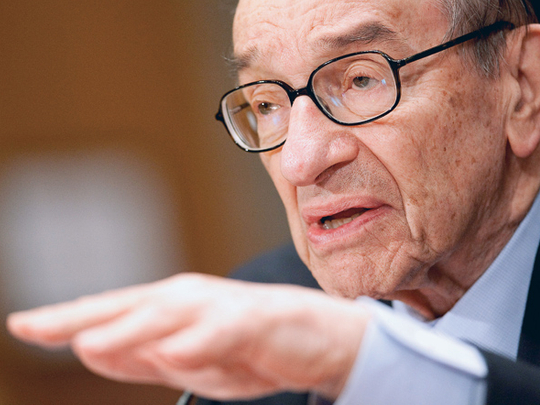
Ben Bernanke may minimise the role of monetary policy in the housing debacle, but he minimises two key factors; the effect low rates and the Fed's policy of cleaning up after but not popping bubbles had on risk-taking.
In what amounts to a defence of his own legacy and that of Alan Greenspan (pictured above), Bernanke maintains that low interest rates didn't cause the bubble, which he says required a regulatory rather than monetary solution.
"Borrowers chose, and were extended, mortgages that they could not be expected to service in the longer term. They were provided these loans on the expectation that accumulating home equity would soon allow refinancing into more sustainable mortgages," Bernanke said in Atlanta over the weekend.
And where did borrowers get the idea that these new-fangled mortgages were good for them and that double-digit house price increases would continue? Greenspan famously sang the praises of mortgage innovation and floating rates for house buyers, while both he and Bernanke missed the bubble and downplayed its potential impact almost all the way to the bottom.
Even more to the point was the Fed's asymmetrical response to bubbles: doing nothing to pop them on the way up, and dropping rates to ease the pain in their aftermath. So the Fed did after the dot-com crash and so it did again, in spades, after the housing bust.
The Fed under Greenspan, who seemed to believe that markets were not just efficient but somehow magical and whose direction of monetary policy during his term was largely consistent with that point of view, allowed the bubble to form. No amount of retro-fitting the Taylor rule on different variables will change that.
Bernanke now acknowledges that he might be forced to use the blunt force of interest rates against future housing bubbles, but his speech seems designed to leave the reader with the impression that higher rates are a last worst choice.
So it seems that Greenspan's asymmetry has been made a bit more even by Bernanke, though given the experience of the last few years, that is still pretty scary. The incentives and attitudes, at least toward financial innovation, are still there and so is the belief that the Federal Reserve will be there to ease the pain if another bubble pops.
Bernanke makes the argument that the effect of lower rates pales in comparison with the impact of products that defer payments or allow borrowers to keep payments lower in exchange for more risk.
It's not hard to argue that the Federal Reserve, as an interest rate setting body, had a bigger impact on house prices during the brave new world period of heavy securitisation than perhaps it had when Fannie, Freddie and their non government-backed competitors were smaller.












